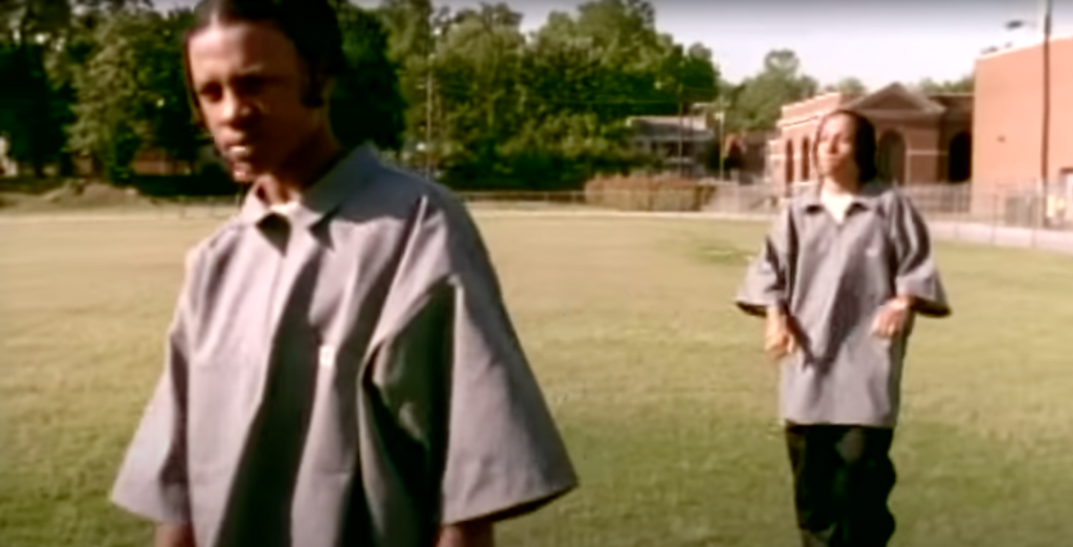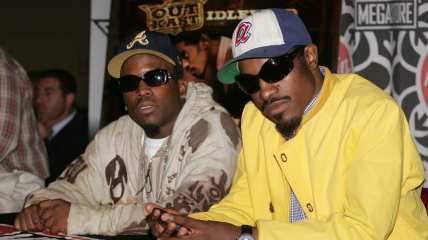93 ’til Infinity: Kriss Kross’ ‘Da Bomb’ and the struggle of growing up hip-hop
OPINION: Kriss Kross’ sophomore album showed just how hard it could be to try to trade in pop success for authenticity, especially for a teenage crossover act.

Editor’s note: The following article is an op-ed, and the views expressed are the author’s own. Read more opinions on theGrio.
I won’t pretend to know what it’s like to have to follow up an album that sold four million copies on the strength of a single and a gimmick. But that was the charge laid before Jermaine Dupri, the (now legendary) music producer and his group, Kriss Kross (comprised of Chris “Mac Daddy” Kelly — RIP — and Chris “Daddy Mac” Smith), who shot to the top of the charts and pop success with their first album, “Totally Krossed Out” on the strength of the hit single, “Jump,” and wearing their clothes backward. In 1991, you absolutely could not get away from hearing the Jackson 5-sampling jam on the radio or video. At the time of the release of their first album in March 1992, the Chrises were 13 and 14 years old, and probably the coolest and most popular teen act in America.
Fast forward a year later and a year older, Kriss Kross dropped their sophomore record, “Da Bomb,” on Aug. 3, 1993, similarly produced and written entirely by Jermaine Dupri (with co-writing credits on two songs from Chris Kelly), and Kriss Kross sounded like an entirely different group. Granted, things change quickly in the life of a teenager, but this change was dramatic. For one, the Chrises were rapping like they’d listened to one rapper and one rapper only since they hit it big: Snoop Dogg. “Da Bomb” felt like it took so many cues from the West Coast sound that if you had told me they were two kids from Los Angeles, I’d believed you.
Dr. Dre’s “The Chronic” dropped in December 1992, and it hit like an atom bomb (no pun intended). To say it was influential would be an understatement; lots of groups all over the nation began to take on a West Coast effect in sound, tone and language. However, Kriss Kross were young teens who had just burst on the scene as pop sensations, perhaps to their own chagrin. On “Da Bomb,” they were rapping about hood life, slanging guns, their enemies, using the n-word a lot and proclaiming how “real” they were. This was an odd stance to take for a group that presumably didn’t have to worry about any of that stuff anymore.
Of course, I don’t think anybody thought they were rich — they didn’t write or produce any of their music — but “keeping it real” just didn’t seem like their lane either. It didn’t seem like they needed to. It felt … contrived. Almost like an attempt to undo their pop success and get their respect in the streets, which could have been the plan; once the gimmick of “Jump” and the cute kids wearing their clothes backward faded — which it did — there was going to be a need for a rebrand and makeover to some degree in order to continue making music.
Which seemed like a truly difficult thing. These were two Black boys from the streets of southwest Atlanta, in hip-hop. They weren’t singers where a polished image would serve them; they did need to find a way to relate to the hip-hop audience unless they were going to try to stay in the pop lane forever, which I’m guessing neither of the Chrises nor Jermaine Dupri wanted to do. Also, as the Chrises grew up and got bigger, I imagine they wanted to rap more about the world they actually knew as Black teenage boys. The poppy, cute stuff ran its course: What did teenage boys from the inner city talk about? Perhaps, “Da Bomb” is that content, except it was a 180 from where they had been just a year prior. I almost wonder if there was any way they could have win. They couldn’t stay pop but talking about guns and trying to be hard without using “hard words” (to avoid a parental advisory sticker) also didn’t work. I can imagine it presented the Chrises and Jermaine Dupri with a bit of an identity crisis.
The interesting thing is that the first single from the album, “Alright,” actually worked to perfection. Sure, the boys looked like Snoop Dogg miniatures in the video, but the song itself, with Super Cat assisting on the hook, was a dope, breezy summertime anthem. The rest of the album though, felt entirely cribbed from the Dr. Dre school of music, complete with several Snoop Dogg vocal samples. Several of the beats even sounded like they could have been outtakes from “The Chronic” sessions. It felt too inspired by “The Chronic,” especially for 14-year-olds who were just all over the radio telling folks to jump.
I personally remember buying this album on my last weekend in Michigan before heading to my new home in Madison, Ala. I also remember hearing Da Brat and being impressed but also confused by this hardcore (in my view) sounding version of Kriss Kross. I also know I didn’t care that much; at that point, I wasn’t concerned about a critical analysis of who the group was. All I knew was that I loved Dr. Dre and DJ Quik and this sounded like a bargain version of it from some kids I didn’t believe, so the album didn’t get much play from me, short of “Alright.”
Looking back, though, I do wonder what the conversations were back then about how to construct the album and audience. It was 1993 so the hip-hop business convos probably weren’t as sophisticated as they are now, but still, Jermaine at least had to know it was a risk. And the album isn’t even bad; it’s not good either, but it isn’t bad. It just felt inauthentic, odd for an album with a song and single literally titled, “I’m Real.” That song in particular just felt wrong.
This whole thing would come to an end three years later with an album that actually was alright, their third and final album, “Young, Rich & Dangerous.” But by then, when they were actually old enough to be themselves in a hip-hop sense, we’d all moved on.
And that’s real.

Panama Jackson is a columnist at theGrio. He writes very Black things and drinks very brown liquors, and is pretty fly for a light guy. His biggest accomplishment to date coincides with his Blackest accomplishment to date in that he received a phone call from Oprah Winfrey after she read one of his pieces (biggest), but he didn’t answer the phone because the caller ID said: “Unknown” (Blackest).
Make sure you check out the Dear Culture podcast every Thursday on theGrio’s Black Podcast Network, where I’ll be hosting some of the Blackest conversations known to humankind. You might not leave the convo with an afro, but you’ll definitely be looking for your Afro Sheen! Listen to Dear Culture on TheGrio’s app; download it here.


